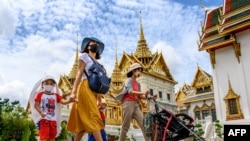The novel coronavirus has led to a diverse array of crises for Thailand. Paramount are the nation’s healthcare and economy. But the pandemic has also impacted Thailand politics, with Prime Minister Prayuth Chan-ocha delaying a necessary cabinet reshuffle and extending a state of emergency.
Analysts say the postponed reshuffle has placed the government in political limbo. The military, which came to power in a 2014 putsch, governs Thailand with a coalition of parties. One of them, the Palang Pracharath Party, saw 18 members resign last week after a schism over how Thailand is responding to Covid-19. The resignations force an election within the party, which in turn could change which party members are part of the executive cabinet.
Despite the political uncertainty, Prayuth, a military general, has a tighter grip on power. He has extended an emergency decree until June 30, which the state has invoked to arrest protesters, harass journalists and whistleblowers reporting unfavorable information, and intimidate health workers who complain of shortages of much need medical supplies. The government says the measures are necessary to fight the virus.
“The emergency decree provides Thai authorities unchecked powers to suppress fundamental freedoms with zero accountability,” Brad Adams, the Asia director at Human Rights Watch, said.
The tighter control follows a pattern around the world. Central governments have used the virus as a reason to acquire emergency powers, from the troops deployed in Chile’s streets, to the city cameras that Russia has tapped to surveil citizens.
Problems multiply
In addition to its political crisis, Bangkok is having to address other problems as well, including a record drought, and an economic slowdown. Tensions came to a head this week, when lawmakers walked out of a committee meeting to discuss the billions of dollars Thailand will spend on the Covid-19 recovery. Disagreement over spending and other virus responses was also behind the mass resignations of party members last week.
Scholars Rawin Leelapatana and Khemthong Tonsakulrungruang argue that the problems have been simmering. Earlier this year, they said, Thais were already angry that the state had cracked down on opposition party members.
“Dissatisfaction soon grew into other topics such as Prayuth’s failure to rescue the country’s sinking economy and to clean the government of corruption,” Rawin and Khemthong wrote in Verfassungsblog, an academic forum.
Covid-19 was a useful distraction, they said, writing, “The pandemic, therefore, offers Prayuth much-needed cover and respite.”
Thailand was the first nation outside China to report a case of the virus. So far, the virus has killed 58 people and infected 3,125 in the southeast Asian nation. The virus has hurt overlooked populations in particular, such as prison inmates and undocumented migrants, activists say.
The United Nations Children’s Fund said it is reaching out to migrants and others in the Thailand to provide medical aid, emergency grants, information on hygiene practices and mental health support.
“Migrants and other vulnerable groups were already facing a number of challenges even before the pandemic because of their status, language barriers, social stigma and discrimination,” said Thomas Davin, the UNICEF representative in Thailand. He added, “It is our collective responsibility to support the most vulnerable, regardless of their legal or ethnic status, and ensure that they are safe and have access to services to survive and stay healthy.”




